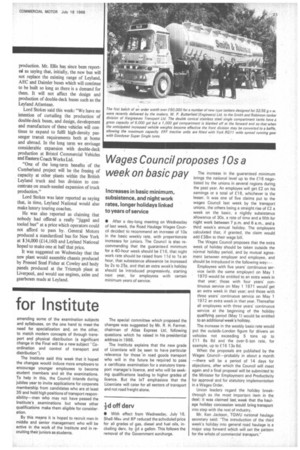Wages Council proposes 10s a week on basic pay
Page 25

If you've noticed an error in this article please click here to report it so we can fix it.
Increases in basic minimum, subsistence, and night work rates, longer holidays linked to years of service
• After a day-long meeting on Wednesday of last week, the Road Haulage Wages Council decided to recommend an increase of 10s in the basic weekly rate, with proportionate increases for juniors. The Council is also recommending that the guaranteed minimum for a 40-hour week should be £16, that night work rate should be raised from 11d to 1s an hour, that subsistence allowance Lae increased by 2s to 25s, and that an extra week's holiday should be introduced progressively, starting next year, for employees with certain minimum years of service.
The increase in the guaranteed minimum brings the national level up to the £16 negotiated by the unions in several regions during the past year. An employee will get £2 on his earnings or a total of £16, whichever is the lesser. It was one of five claims put to the wages Council last week by the transport unions, the others being a straight rise of £2 a week on the basic, a nightly subsistence allowance of 30s, a rate of time and a fifth for night work between 7 p.m. and 6 a.m., and a third week's annual holiday. The employers calculated that, if granted, the claim would add £38m to their wage bill.
The Wages Council proposes that the extra week of holiday should be taken outside the nOrmal holiday period, and by mutual agree ment between employer and employee, and should be introduced in the following way:— Employees with five years' continuous service (with the same employer) on May 1 1970 would be entitled to an extra week in that year; those with four years' continuous service on May 1 1971 would get an extra week in that year; and those with three years' continuous service on May 1 1972 an extra week in that year. Thereafter all employees with three years' continuous service at the beginning of the holiday qualifying period (May 1) would be entitled to an additional week's holiday.
The increase in the weekly basic rate would put the outside-London figure for drivers on vehicles not exceeding 5 tons up to £11 8s 6d and the over-5-ton rate, for example, up to £16 13s 6d.
When the proposals are published by the Wages Council—probably in about a month —there will be a period of 14 days for objections, after which the Council will meet again and a final proposal will be submitted to the Minister for Employment and Productivity for approval and for statutory implementation in a Wages Order.
Union leaders regard the holiday breakthrough as the most important item in the deal; it was claimed last week that the haulage holiday concession would bring transport into step with the rest of industry, Mr. Ken Jackson, TGWU national haulage secretary said: "The introduction of the third week's holiday into general road haulage is a major step forward which will set the pattern for the whole of commercial transport."
















































































































